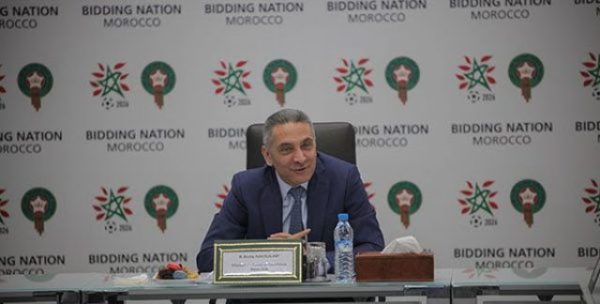No, it’s not played yet. The award of the 2026 World Cup will not be settled on the green carpet, far from prying eyes by a FIFA executive committee which, in the days of the Swiss Joseph “Sepp” Blatter, decided life or death.
The rules have changed. And, with the fall of the football business monument, a new team took over. A new team led by Italian Gianni Infantino, former president of UEFFA, the European football federation, hard core, if any, of FIFA.
This new team will have to arbitrate between the candidatures of Morocco and the whole USA, Mexico, Canada for the world cup 2026. The choice will be made on June 13 in Moscow. It is not easy. The triple North American bid is actually marketing, as 66 of the 86 matches will take place at Uncle Sam. Already the organizer of the 1994 edition, the US is hiding behind a trio by conceding in Mexico and Canada the honor to host 20 games.
Responsible for the fall of the Blatter through a series of hearings and investigations that affected all decision-makers of FIFA but also related bodies, the USA were a favorite at the beginning of the process. Initially, it was a simple assignment since no other candidate was on the horizon. But in August 2017, a coup de theater: Morocco presents its candidacy on behalf of an African continent that had the honor of hosting the queen competition once, in 2010, but must, a priori, wait until 2037 to submit a new application.
For 2030, the tournament will return to Uruguay, first world champion nation, in a kind of anniversary of 100 years of the World Cup. China will then host the championship in 2033.
Clearly, if Morocco fails, the continent will have to wait 20 years to caress the dream round. The kingdom Sherifian who presents for the fourth time this time has a concrete record, far from the models of previous applications. Five of the 12 stadiums to host the tournament are ready. In addition to infrastructure, Morocco relies on a president of the Federation, Fouzi Lekjaa, who revolutionized football at the national level and, at the continental level, succeeded in replacing the Cameroonian Issa Hayatou by the Malagasy Ahmed Ahmed, the promoter of the renewal project. of the African Football Confederation (CAF).
Minister of Finance, Fouzi Lekjaa began the reform of Moroccan football by the nerve of war without which no transformation is possible. As a result, two executives were seconded to each club for youth training and mentoring. Lawns of 8 million dirhams (800,000 euros) were allocated to the stadiums.
But the real chance of Morocco lies in the terms of award of the World Cup. Exit then the executive committee to the Blatter. Instead, it is the countries that vote. In this case, there will be 211 voters. Morocco will be full of tanks with the Confederation of African Football (CAF) where, of the 53 African countries, 49, including Algeria, Nigeria, Egypt and South Africa, have already given him a voting agreement. In the Arab world, the kingdom has gleaned 16 first-line supporters. Remains Europe, the Greater Europe, which, she says, will vote according to its interests backed certainly on the rights of rebroadcasting and, in turn, on the time zone. In addition to France, whose president of the Football Federation, Noël Le Gret, has already voted in favor of Morocco, 11 countries of the old continent have provided support to the kingdom.
Such a wave of membership surprised President Infantino, whom many observers find favorable in the US. This would explain to Moroccans the establishment of a mysterious task force and the attempt to change the designation system. Remember that the rating system was indeed transmitted by FIFA to Morocco on March 14, less than twenty-four hours before the submission of his application and forty-eight hours before the deadline for submission of records. In addition to these hastily designed rules, FIFA has set in motion the so-called task force which, if it can not vote, could invalidate an application.
Barely established, this task force is sent to Morocco, she says, to closely inspect the various elements of the case. Again, the task force is surprised by the state of roads, stadiums, airports, telecommunication networks and, unlike in the US and Canada, the popular fervor around football , distant cousin of Soccer.
Nevertheless, the task force leaves the argument club, the demography. The cities to host the games must have more than 250 000 inhabitants and all.
Fortunately, great football nations have been keen to put a stop to suspicious FIFA maneuvers. Germany demanded the vote. And suddenly, what seemed signposted and easy becomes dangerous and uncertain for the US bid. The famous tweet of Donald Trump betrays a certain exasperation. Fortunately football remains a sport that has nothing to do with strength.



